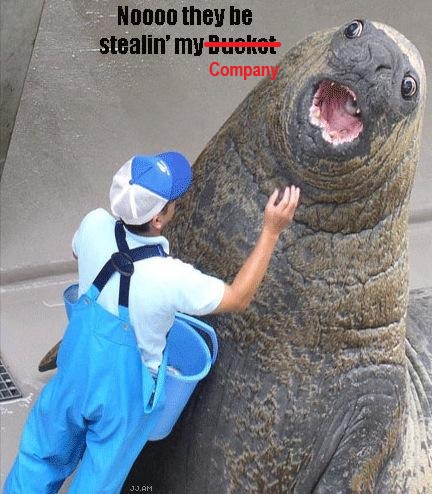Interpublic Group and Omnicom – An Undervalued Company Buys Another One

Thanks for the opportunity to use the ancient meme.
One of the peculiar risks of value investing is that the underpriced company that you spent all that time and effort analyzing will be bought out from under you before the gap between its price and intrinsic value is resolved. Ordinarily the acquisition comes at a premium to the market price, but sometimes even this premium price is less than one’s calculated value, and ironically the larger the margin of safety and the more attractive the company’s price, the greater the risk is. It happened to me years ago with Qwest, and the Interpublic Group (IPG) acquisition is another example.
Interpublic Group is an advertising company that I ran across some months ago that reflected this situation. Last December it was announced that IPG would be acquired by Omnicom, a slightly larger advertising firm (and what is with advertising companies having sinister names?). The FTC has given its final approval and the merger is likely to close soon, and unfortunately the price has settled somewhat on the low side of fair value.
Actually time has made a fool of this deal; when it was proposed in Dec 9th, each share of IPG was to be exchanged for .344 shares of Omnicom, but Omnicom was at $102 before the merger was announced and $92 immediately afterwards. At the time this implied a price of $31.65 for Interpublic Group. But as of this writing Omnicom is at $72.65 which puts IPG at almost exactly $25, just a tiny premium over the current share price of $24.85 representing the market’s near certainty that the merger will go through as planned.
However, Omnicom itself is slightly underpriced in my view, offering a free cash flow yield of 12% at current levels and it is actually increasing sales (unlike IPG where sales are flat or declining). So Omnicom is committing a more common risk than an inadequate acquisition price. In general, a company that is underpriced should be repurchasing its stock, a company that is fairly priced should be paying dividends, and a company that is overpriced should be using its stock to acquire cheaper companies. Omnicom is doing it backwards.
Interpublic Group is an advertising agency and PR firm operating in traditional and digital media, as well as related services. As of now it has a market cap of $9.1 billion. It has a cash balance of $1.5 billion but its current assets exceed current liabilities by only $600 million. For the last full year, sales were $10.7 billion and operating income was $1.2 billion. There was a goodwill impairment of $232 billion and excess depreciation of $117 million, resulting in operating cash flow of $1.55 billion. Net interest expense was $80 million (as the company maintains a large cash balance there is substantial interest income), resulting in free cash flow of $1.25 billion after estimated taxes. In 2023 sales were $10.9 billion and free cash flow was $1.17 billion, and in 2022 sales were $10.9 billion and free cash flow was $1.08 billion.
Year to date, sales declined by 3.5% year over year, most significantly in the UK and Asia. I can attribute part of that to the impending merger interrupting client acquisition. At any rate, operating cash flow (net of merger-related restructuring charges) comes to $441 million as compared to $416 million last year. Impressively, expenses declined faster than revenues so margins improved. So, based on a 10% return on investment and flat growth, it would appear that IPG is underpriced or on the low end of fairly priced.
Meanwhile, over at Omnicom, there is a substantial cash balance but no excess cash. For 2024 sales were $15.7 billion and operating income was $2.27 billion. Excess depreciation of $101 million and net interest expense of $147 million produces free cash flow of $1.76 billion. For 2023 sales were $14.7 billion, operating income of $2.10 billion and free cash flow of $1.74 billion, and for 2022 sales were $14.3 billion, operating income was $2.08 billion, and free cash flow was $1.65 billion.
This year to date, sales increased from $7.7 billion from $7.5 billion, operating income was $892 million compared to $989 million, plus excess depreciation of $46 million as compared to $58 million, interest expense of $70 million versus $68 million, leaving free cash flow of $686 million versus $773 million. This includes nearly $100 million in acquisition-related costs. At any rate, based on the 2024 results Omnicom has a free cash flow yield on the order of 12.5%, suggesting that the company is somewhat underpriced.
Furthermore, Omnicom also announced that it is expecting $750 million in synergies, mostly in the form of cost savings, and studies (https://knowledge.wharton.upenn.edu/article/how-to-get-mergers-and-acquisitions-right/) show that cost savings are more reliable than other types of synergies and are realized at an average rate of 60-90%. It does seem surprising that a merger (net of severance costs some of which are yet to be realized) could produce billions of value simply by consolidating some redundant departments, but even if a fraction of the synergies are realized this would enhance the value of an already underpriced company.
So, even though this merger is not the ideal outcome from a value investing perspective, either Interpublic Group or Omnicom would seem to be an enticing candidate for portfolio inclusion.
Leave a Reply